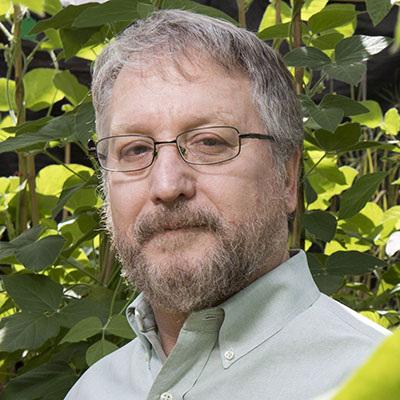De-bugging soybean: Characterization and deployment of resistance to defoliating insects
Plant Biology
October 28, 2024 @ 12:15 pm to 01:15 pm
108 Wartik Laboratory
University Park
Featuring:

Wayne Parrott
University of Georgia
Co-sponsored by the Plant Institute
Abstract:
Caterpillars limit soybean production, especially in the Southern USA, and thus require insecticide applications that increase production costs. However, as insecticides lose their effectiveness and climate change promotes caterpillar growth, caterpillars are an increasingly important pest in parts of the Midwest and into the Dakotas. Caterpillar pests are forecast to continue intensifying in the future. Nevertheless, genes for resistance to a broad range of caterpillars and other defoliators exist in soybean germplasm. We spent two decades making near isogenic lines with various combinations of these genes, enabling the study of resistance genes alone or in combination. We identified two QTLs that are particularly effective when combined. These were introgressed into new UGA elite lines, and the resulting lines are among the top yielders in the USDA preliminary soybean tests and the USDA uniform soybean tests, clearly showing the value of incorporating resistance to defoliating insects. One of the genes underlying a QTL has been cloned, and it is a non-functional flavonoid glucosyl transferase. A candidate gene has been identified for the second QTL, and it is a transcription factor that also helps regulate flavonoids. Non-targeted metabolomics identified 1064 metabolites that are upregulated in the resistant lines, but no new metabolites. Collectively, the results suggest that increased levels of flavonoids are responsible for resistance. Additional QTLs for defoliator resistance have been identified, and their study and evaluation should give additional insight into defoliator resistance in soybean.
About the Speaker:
Wayne Parrott received a BS in Agronomy from the University of Kentucky and an MS & PhD degree in Plant Breeding and Plant Genetics from the University of Wisconsin. He is now a Distinguished Research Professor at the Department of Crop and Soil Sciences at the University of Georgia. There, he has been conducting research on the development, use, and safety of transgenic and edited crops. He has published over 130 refereed journal articles. He is engaged in training graduate students and postdoctoral fellows and teaches graduate-level courses in plant genetics. He is currently serving as director of the university’s Institute of Plant Breeding, Genetics & Genomics. Wayne has worked extensively to inform public policy on modern genetic approaches toward improving agriculture, has also served on task forces that developed best-practices for GMO food and feed safety evaluation, and published a guide for environmental risk assessment of GMOs. He has traveled to over 45 countries to advise legislators and regulators on the foundations for a functional regulatory system for GM and edited products. He also served as chair of the biotechnology section of the Crop Science Society of America and of the plant section of the Society for In Vitro Biology and was secretary and meeting program chair for ASPB. He is a fellow of those three societies and of AAAS. He served a term as a co-director for the NSF Plant Genome Research Program, and is currently a founding member of PlantGENE, a research coordination network to help disseminate tissue culture technology.

Contact
Mark Guiltinan
mjg9@psu.edu